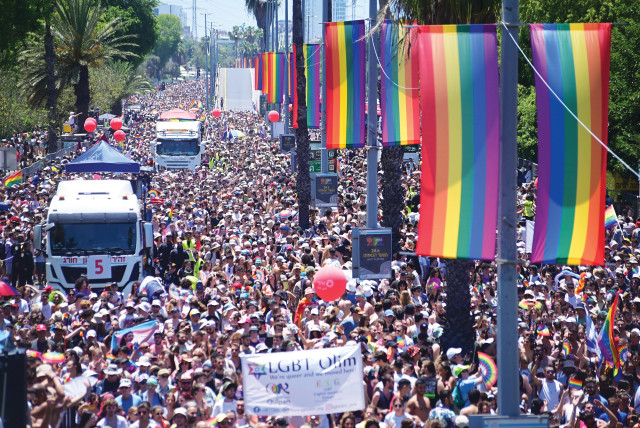'Palestinian, not Pride flag should be raised': Guardian reports on Israel's 'pinkwashing'

“LGBTQ+ liberation has been co-opted by the Israeli state that to a gay Palestinian it now serves only as a reminder of the horror unfolding just 60 miles south."
Palestinian Israeli citizen and veteran queer activist Daoud told the Guardian that he was overcome by a wave of revulsion when he walked past pride flags put up in Jaffa to celebrate Pride Month in an interview published on Sunday in a report titled “‘No pride in occupation’: Queer Palestinians on ‘pink-washing’ in Gaza conflict.”
The article claims, “the most famous symbol of LGBTQ+ liberation has been so co-opted by the Israeli state that to a gay Palestinian like him it now serves only as a reminder of the horror unfolding just 60 miles south.”
The article then notes two social media posts by the State of Israel’s account. One depicts Israeli soldier Yoav Atzmoni holding a rainbow flag with a hand-scrawled message: “In the name of love” in front of piles of rubble.
'Pinkwashing'
The other shows Atzmoni beside a tank, grinning as he displays an Israeli flag with rainbow borders.
“The first ever Pride flag raised in Gaza,” the caption for both images said.
In Atzmoni’s Instagram post on his personal page, he shared the photo with the caption, “Saving the only democracy in the Middle East.”
Daoud said he was disgusted by these images.
According to Phillip Ayoub, professor of international relations at University College London, who researches the intersection of politics and LGBTQ+ rights, “That cognitive disconnect of seeing what else is in the image – rubble that was people’s homes – then seeing the flag being displayed in a celebratory way," the Guardian quoted him as saying. "It is a massive violation to people who have fought for their rights under this flag.”
“For me now, the Palestinian flag should be raised, not the Pride flag,” Daoud added.
The article notes that critics of Israel say the Jewish state engages in "pinkwashing" through attempts to strengthen its own image by depicting itself as a direct alternative to the"violently homophobic" Palestinian identity.
The Guardian added that when Rauda Morcos, a Palestinian citizen of Israel who is a human rights lawyer and award-winning activist, heard that Tel Aviv still planned to hold Pride this year, she was stunned.
“Is there no sense of humanity to realize that there are people being bombed every day in Gaza by your own country [Israel]?" she asked. "And you’re calling for Pride and equal rights for queer people? Who cares at the moment if you have equal rights [as queers]? I honestly don’t care, because if we don’t have equal rights as humans, it doesn’t matter.”
Back in 2006, Morcos reportedly campaigned to boycott the Jerusalem Open House's WorldPride parade in light of Israeli attacks on Gaza.
Daoud expressed his belief that there is no future for a joint struggle for LGBTQ rights between Palestinians and Israeli Jews as the latter value their privilege as Jews in in Israel over their “shared” queerness."
The Guardian article briefly noted the discrimination faced by queer Palestinians, both in public and in private within Palestinian society, adding a link to a June 2018 Human Rights Watch report.
In February of this year, the Tel Aviv District Court ruled that LGBTQ+ Palestinians in danger due to their sexual orientation can request asylum in Israel.
Jerusalem Post Store
`; document.getElementById("linkPremium").innerHTML = cont; var divWithLink = document.getElementById("premium-link"); if (divWithLink !== null && divWithLink !== 'undefined') { divWithLink.style.border = "solid 1px #cb0f3e"; divWithLink.style.textAlign = "center"; divWithLink.style.marginBottom = "15px"; divWithLink.style.marginTop = "15px"; divWithLink.style.width = "100%"; divWithLink.style.backgroundColor = "#122952"; divWithLink.style.color = "#ffffff"; divWithLink.style.lineHeight = "1.5"; } } (function (v, i) { });

